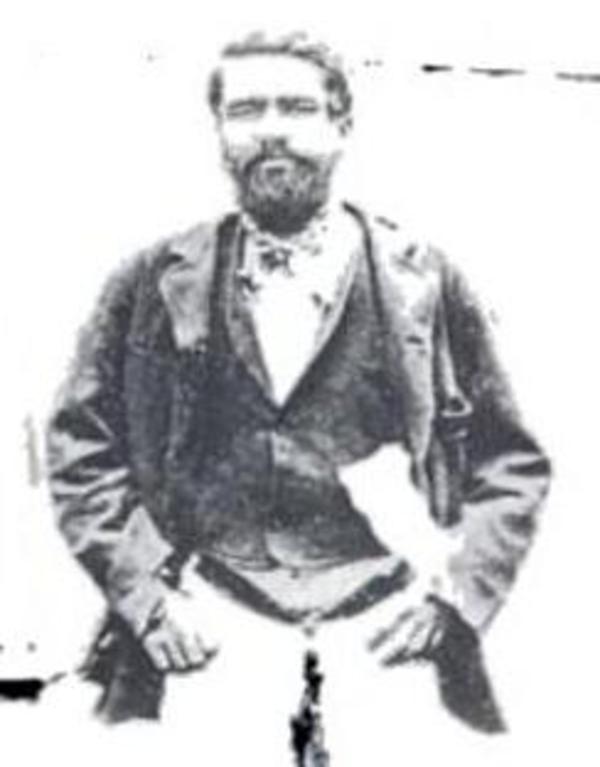
Source: Courtesy of Wikimedia Commons
McLEAN, ALLAN, horse-breaker and outlaw; b. in 1855 at Thompson’s River Post (Kamloops, B.C.), seventh son of Donald McLean* and eldest son of Sophia Grant; d. 31 Jan. 1881, by hanging, in New Westminster, B.C.
Allan McLean’s father, a Hudson’s Bay Company chief trader, had taken charge of the company post at Thompson’s River in 1855, the year after his marriage to Sophia Grant, a Colville Indian. Following Allan’s birth, two daughters and two more sons, Charley and Archie, were born before Donald McLean died in the war against the Chilcotin Indians in 1864. The family was then ranching near the village of Cache Creek. For five years his widow received a small pension, but in 1867 she sold the ranch and later moved to Kamloops. Donald’s sister refused to recognize his Indian marriage and claimed his estate, causing legal arguments to continue for years. Meanwhile the young family was thrown on its own resources, belonging to neither the white nor the Indian communities. The boys virtually grew up in the saddle, working at various ranches mainly as horse-breakers and jockeys.
In the depression of 1877 jobs were scarce in Kamloops; gold fever had abated and surveying for the Canadian Pacific Railway had ceased. The three boys ran wild, joined by Alex, half-breed son of Nicholas Hare, who was in trouble with the authorities for assault and cattle-rustling. Thefts of horses, ammunition, liquor, food, and clothing ensued in the district.
John Tannatt Ussher was a farmer who also served as gold commissioner, government agent, constable, and jailer; he had little time or incentive to chase wild horsemen who could easily break out of the pathetically insecure jail. With Allan in the lead, the boys’ contempt for the law increased with more raids and threats to local dignitaries, including John Andrew Mara, mla and merchant, who, Charles Augustus Semlin* reported, had seduced their sister, Annie McLean, and fathered her child.
On 3 Dec. 1879 the outlaws stole a stallion from rancher William Palmer, who promptly reported its loss to Ussher. John Thomas Edwards, jp, issued a warrant for the arrest of the McLeans and Hare, and rewards were posted. With Amni Shumway as guide, Ussher, Palmer, and John McLeod set out to arrest them and surprised the boys drinking at their camp near Long Lake on 8 December. Ussher had not expected violence, but shots were fired and panic reigned. McLeod and Allan were wounded, and Ussher was killed. The McLeans fled to the Nicola Valley Indians, pausing at ranches to steal firearms. During their flight they killed another man, James Kelly. Allan, married to a daughter of Chief Chillihetza, probably hoped to instigate an Indian uprising, but gained no support. The McLeans and Hare then took refuge in a cabin near Douglas Lake.
The citizens of Kamloops, already fearing a general rebellion over Indian land grievances, felt decisive action was in order. Posses totalling some 70 men soon besieged the cabin and on 13 December, thirsty beyond endurance, the outlaws surrendered and were taken to Kamloops. There a preliminary hearing under Clement Francis Cornwall committed them to New Westminster jail, charged with the murders of Ussher and Kelly.
The trial of Allan, Charley, and Archie McLean and of Alex Hare, opened on 13 March 1880 after arguments about venue and authority for this special assize. Judge Henry Pering Pellew Crease* stressed the plight of fatherless half-breeds as outcasts, but the guilty verdict was a foregone conclusion. On 20 March they were sentenced to hang. Yet the legal debate continued, since no proper commission had been issued for the special assize. Eventually the British Columbia Supreme Court decided unanimously on 26 June that the assizes were invalid. The boys endured a second trial on 10 November and were again sentenced to death. They were hanged on 31 Jan. 1881 at New Westminster, apparently repentant.
Allan left his widow and two children with the Nicola Valley Indians; his son George was decorated in 1917 for exceptional bravery at Vimy Ridge.
Kamloops Museum (Kamloops, B.C.), HBC letters, 1879. In the Supreme Court of British Columbia; the Queen vs. Allan McLean, Archibald McLean, Charles McLean, and Alexander Hare, indicted, found guilty, and sentenced to death for the murder of John Ussher . . . , ed. H. P. P. Crease (Victoria, 1880). Daily British Colonist (Victoria), 11, 13, 14, 16, 18, 28 Dec. 1879; 1, 20 Jan., 15, 20 Feb., 11, 14, 16–20 March, 18 May, 1, 8, 9, 13, 27 June, 19 Nov. 1880; 23 Jan., 1 Feb. 1881. Inland Sentinel (Yale, B.C.), 25 Nov. 1880, 3 Feb. 1881. Mel Rothenburger, “We’ve killed Johnny Ussher!”: the story of the wild McLean boys and Alex Hare (Vancouver, 1973). “German killer returns home; Kamloops crowd meets hero of Vimy Ridge who was awarded dmc,” Kamloops Telegram (Kamloops, B.C.), 11 Oct. 1917.
Cite This Article
Mary Balf, “McLEAN, ALLAN,” in Dictionary of Canadian Biography, vol. 11, University of Toronto/Université Laval, 2003–, accessed January 20, 2025, https://www.biographi.ca/en/bio/mclean_allan_11E.html.
The citation above shows the format for footnotes and endnotes according to the Chicago manual of style (16th edition). Information to be used in other citation formats:
| Permalink: | https://www.biographi.ca/en/bio/mclean_allan_11E.html |
| Author of Article: | Mary Balf |
| Title of Article: | McLEAN, ALLAN |
| Publication Name: | Dictionary of Canadian Biography, vol. 11 |
| Publisher: | University of Toronto/Université Laval |
| Year of revision: | 1982 |
| Access Date: | January 20, 2025 |



